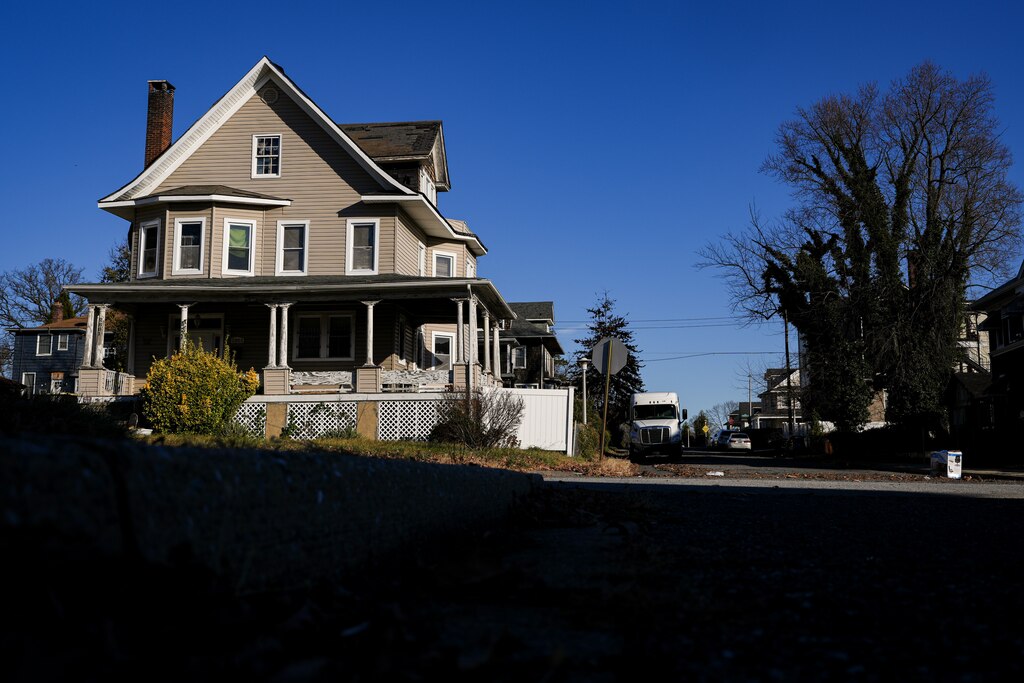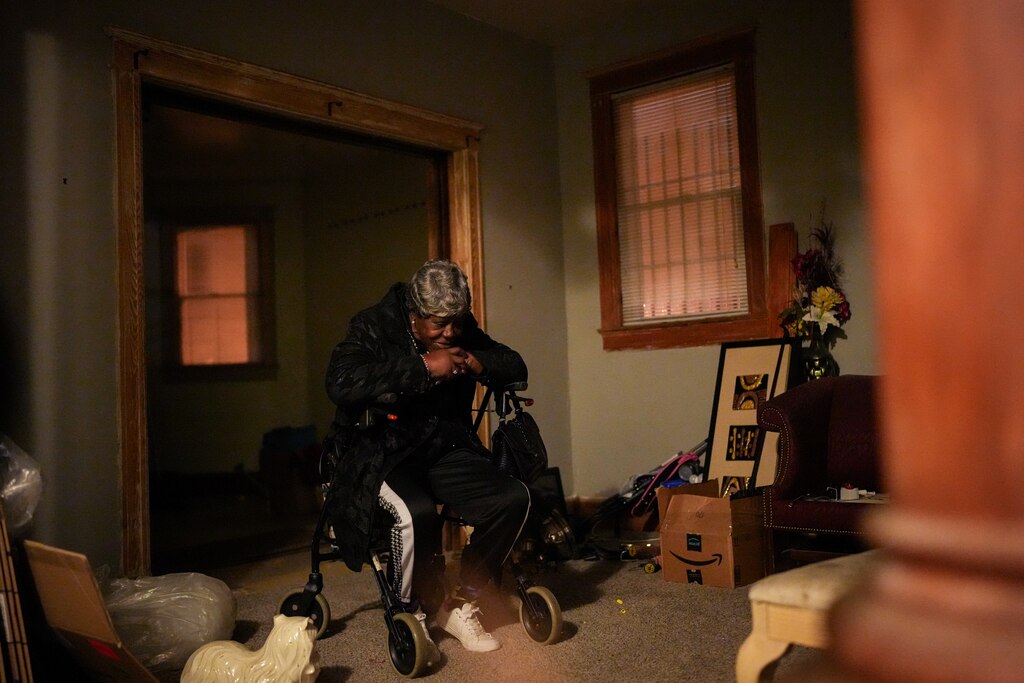It’s dark and cold in the home that once belonged to Bonita Anderson.
She has just a few days left to move out her things — a small space heater, a couch without cushions, a Christmas garland.
Anderson’s lived in the corner lot Northwest Baltimore home for 15 years, purchasing it for $100,000 in 2009. A former caregiver, she spruced up the place and took pride in hosting her grandchildren. But a few years ago, while recovering from a combination of cancer and COVID-19, Anderson fell behind on her property taxes and lost the home in a tax sale death spiral.
“I am 70 years old and homeless,” Anderson said one chilly December night, some half-empty boxes and garbage bags strewn around her feet. “This is an ordeal I wouldn’t wish on anyone.”
The Baltimore Banner thanks its sponsors. Become one.
She tried to dig her way out. Anderson paid the city more than $19,000 from 2020 to 2024 — not knowing she had already missed the deadline to reclaim her property. Instead of applying those payments to the $5,400 tax debt, the city used those funds to pay for the home’s property taxes accrued after the tax sale, according to a lawsuit filed by her attorney earlier this year in Baltimore City Circuit Court.

Anderson isn’t the first person to lose her home in the tax sale labyrinth. Over the last decade, state and local lawmakers have taken steps to make the system more humane. For example, it now takes $750 of debt to end up on the tax sale list, up from $250. And Baltimore homeowners can no longer be subject to tax sale due to delinquent water bills alone.
Still, homeowners have continued to fall through the cracks, sometimes due to technicalities and other times due to city errors. Others have unfairly rigged the system: Earlier this year, a Baltimore employee pleaded guilty to accepting cash bribes over a nearly eight-year period in exchange for removing some homes off the tax sale list.
In Maryland, municipalities are required to sell property tax liens in a public auction. The city sells the liens to private entities which become the default debt collectors. If a property owner cannot repay the liens with fees and interest within a short timeframe, the investor can foreclose on the property and take the title.
A 2023 Baltimore Banner investigation found that some 41,000 properties have cycled through the city’s tax sale process since 2016, primarily in Black communities. West Baltimore’s Edmondson Community Organization filed a federal lawsuit in July challenging the tax sale process as unconstitutional and asked a judge to dismantle the system, saying property owners are not being fairly compensated for their homes.
The Baltimore Banner thanks its sponsors. Become one.

Since the case went public, Anderson has joined as a plaintiff. Attorneys at the Baltimore-based Maryland Legal Aid and the Gupta Wessler law firm in Washington, D.C., have alleged that city property owners have been stripped of generational wealth while the city and a small group of “sophisticated” investors profit.
“It’s benefiting the few purchasers who know how to participate in the system, to the harm of city residents,” said Lee Ogburn, a veteran attorney at Maryland Legal Aid. “The city doesn’t benefit from the tax sale purchaser buying this house for a fraction of what it’s worth. The city suffers for that.”
Baltimore Mayor Brandon Scott’s office said they would not comment on the litigation. The finance department had taken steps to increase staffing, improve their operations and “modernize” the tax sale system, a statement from his office said.
Attorneys for the city and for East Coast Tax Auction LLC, which foreclosed on Anderson’s home, each moved to dismiss the federal case in court last week.
City attorney Steven J. Potter, in court records, wrote that “validly conducted tax sale and foreclosure proceedings” do not violate the constitution, and that federal interference would reduce state and local revenues. Elchanan “Elliott” Engel, East Coast Tax Auction LLC’s attorney, argued that Anderson’s case could not be relitigated and that she cannot assert an “unjust enrichment” claim against a private entity.
The Baltimore Banner thanks its sponsors. Become one.
Once a deed is transferred, the homeowner is entitled to receive the difference of the lien and the auction amount. As explained by the plaintiffs’ attorneys in federal court documents, a house with $2,000 worth of liens that is purchased by an investor for $2,001 makes the homeowners entitled to collect $1, even if the homes are worth far more. The city does not require a minimum bid amount — though it could — which helps keeps the auction values low.
Proponents of the system argue that cash-strapped cities such as Baltimore benefit from collecting on their debts and having a mechanism that incentivizes payment.
“Limiting tax sale as a tool ... increases the tax burden on current taxpayers,” according to a 2023 memo for the Maryland Tax Sale Participants Association, and “will cut the funding to vital services needed to stabilize communities and avoid blight.”

In Anderson’s case, she fell behind on her property taxes starting in the 2018 to 2019 fiscal year — around the time of her cancer diagnosis. The first year she fell behind on payments, she owed a little more than $600.
When the Connecticut-based East Coast Tax Auction LLC purchased her $5,400 lien the following year, the home’s assessed value stood at around $185,000, according to federal court documents. It has since risen to $210,700.
The Baltimore Banner thanks its sponsors. Become one.
Ultimately, East Coast Tax Sale Auction purchased the lien for $69,500, according to online tax records. After foreclosing, the LLC paid Anderson $64,100, or the difference between the lien and the auction value.
In an August ruling, Judge Anthony Vittoria denied a motion to reopen and vacate the foreclosure judgment. He ordered East Coast Tax Sale Auction to reimburse Anderson for the $19,336 in taxes she unknowingly covered.
In court documents, the plaintiffs argue that the tax sale system systematically encourages low bids by charging a “high-bid premium,” or fee for bids above 40% of the property value. That, they said, makes it easier for the investors to profit: Between flipping houses and collecting interest, investors have made tens of millions of dollars from Baltimore’s tax sale system since 2016, the Banner’s 2023 investigation found
Since 2021, after becoming mayor, Scott has removed owner-occupied properties from the tax sale list each year in an effort to prevent more cases like Anderson’s. But housing advocates say the administration has not done all it could to protect homeowners, and they hope the lawsuit could be part of larger reforms.
The mayor’s office has not, for example, actively pursued legislation barring “predatory” third-party investors from participating in the process, or pushed to divert residential property owners into payment plans to avoid having their liens sold.
The Baltimore Banner thanks its sponsors. Become one.
Anderson, who left her home for good last week, said the process has left her “broken” and in worse shape than when she received her cancer diagnosis. She hopes the lawsuit can inspire change — if not for her, then for someone else. A daughter in Randallstown will take her in until she finds someplace new.
Judge Brendan A. Hurson could decide on whether to dismiss the case as early as next year.




Comments
Welcome to The Banner's subscriber-only commenting community. Please review our community guidelines.